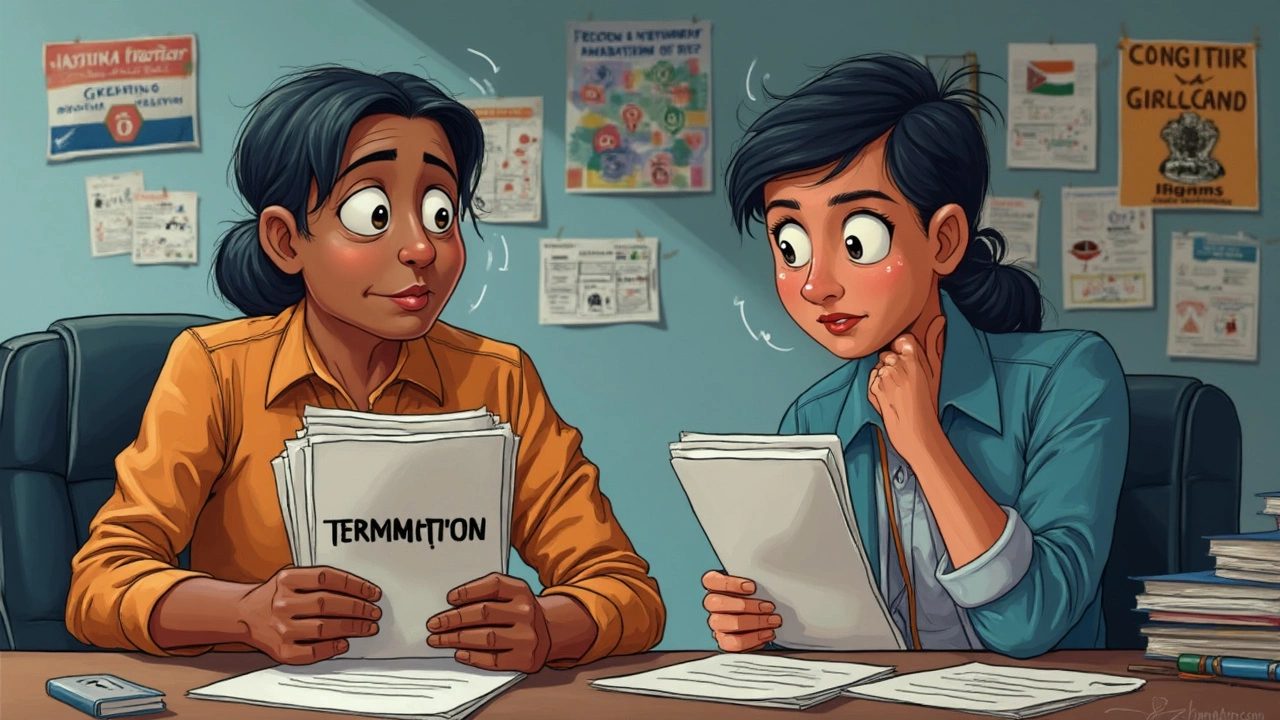Jun
30

- by Dhruv Ainsley
- 0 Comments
If you think government jobs are ironclad and practically unfireable, you're not alone. This belief is everywhere and has shaped how people view civil service for generations. But peel back the layers, and the reality is more complicated—and sometimes more surprising. Sure, government jobs are known for stability, but the notion that they come with lifetime guarantees is more myth than fact. The real question is, what actually does it take to lose a government job? And is job security as bulletproof as it seems? By the end, you'll see this safe harbor in a whole new light.
Why Are Government Jobs Considered So Secure?
The reputation of government job security didn't just happen overnight. For decades, once someone landed a spot in the public sector, neighbors and friends would congratulate them like they just won the lottery. And in many cases, this made sense. Public sector jobs are often protected by unions, service rules, and laws that make firing someone more complex than in a private company. Let’s break down the reasons people think government jobs are untouchable.
First off, civil servants are usually shielded by strict rules. Every step of the hiring and firing process typically involves layers of paperwork, multiple managers, and regulations that are hard to sidestep. In the U.S., for example, the federal government’s firing rate is consistently tiny—over the past decade, less than 1% of federal employees are fired for poor performance each year. In India, the myth goes even deeper. People say, “Once you’re in, you’re in for life.” That’s partly because the dismissal process involves not just the boss’s signature, but sometimes lengthy investigations, legal reviews, and the right to appeal all the way to central commissions.
But even with all these protections, there’s a big difference between being hard to fire and being impossible to fire. The frameworks and unions help ensure people aren’t fired unfairly, but they don’t guarantee you’ll never lose your job. The idea of guaranteed job security is more rooted in tradition and word-of-mouth than reality. Ask anyone who’s actually worked in the system long enough and they’ll tell you about co-workers who didn’t even show up for months, yet managed to keep their jobs—until they didn’t. There’s a fine line between vacationing on the job and pushing your luck too far.
Another reason for the government’s secure reputation is the sheer scale of bureaucracy. The process to fire someone is often drawn out by design. When you want to terminate someone, entire stacks of documentation are needed: records of poor performance, formal notices, warnings, opportunities to improve, and several rounds of reviews. In many European countries, like Germany or France, government employees are protected by strict labor contracts that favor the employee at nearly every stage. That’s why you rarely hear about mass layoffs in government, even during recessions. During the 2020 pandemic, while many private sector workers lost their jobs overnight, public employees were shielded from this level of volatility.
Still, it’s not just protection from being fired that makes these jobs attractive. Government workers also get cushy retirement benefits, paid leave, and set hours. These perks, in addition to security, are major reasons why people flock to government jobs. When you see a line outside a testing center for a coveted government clerk exam, it’s not just about pay. It’s the idea that getting this job is like getting a golden ticket for life.
But the low firing rate doesn’t mean it never happens. According to data from the U.S. Office of Personnel Management, of the 2.1 million civilian federal employees, about 10,000 were removed for discipline or performance issues in 2023. While this is still a small number, it’s enough to make you wonder: what does it actually take to get fired from a government job?
If you want quick numbers, here’s a little table to show how dismissal rates in government stack up against the private sector around the world:
| Country | Sector | Annual Dismissal Rate (%) |
|---|---|---|
| USA | Federal Govt | 0.5 |
| USA | Private Sector | 3.2 |
| India | Central Govt | <0.1 |
| UK | Civil Service | 1.1 |
| France | Public Sector | 0.8 |
A glance at this table shows government jobs clearly are harder to lose than private sector jobs. But they’re not invincible—people do get fired. So, what actually puts someone at risk?

What Really Gets a Government Employee Fired?
The rumors about what it takes to lose a government job are almost as interesting as the job itself. Some folks believe you’d have to commit outright crime to get shown the door. While that’s sometimes true, the reality is broader than that.
Poor performance is one reason, but it requires more than just a couple of bad days. Agencies must give documented warnings, offer training or improvement plans, and create a paper trail. The process is designed to weed out bias and unfair dismissals. In the UK’s civil service, for example, a manager usually must demonstrate at least six months of efforts to help the employee get on track before starting dismissal proceedings. In the U.S., there’s something called a “Performance Improvement Plan” (PIP) that can last 30 to 90 days—and if improvement is made, the process stops. If not, the paperwork builds until firing becomes unavoidable.
Fraud, theft, and criminal activity cut through much of this red tape. Employees caught embezzling funds, falsifying documents, or engaged in harassment or violent behavior have little hope of clinging onto their spots. In 2022, a regional social welfare officer in India was terminated after being caught siphoning pension funds—that investigation took a year, but the evidence was overwhelming. Misuse of government resources, particularly for personal gain, is another fast track to the exit. Even small infractions—like falsifying expense reports—can snowball if it’s not the first time.
Absenteeism is a classic, especially in places where it’s considered a badge of honor to cheat the system. But when there’s a pattern of missing days without leave, skipping mandatory meetings, or abandoning posts, it becomes easy for superiors to build a case. If you’ve heard stories of people who disappeared for weeks and kept getting paid, it’s not as unbelievable as it sounds; however, these cases are becoming less common with electronic attendance systems and tighter monitoring.
Then comes insubordination. Civil servants are expected to follow rules—sometimes to exasperating detail. Repeatedly violating rules, refusing direct orders, or leaking confidential info is a surefire way to put your badge on the chopping block. The truth is, though, in most western democracies, your manager can’t just storm in, say “You’re fired!” and send you packing. The process almost always involves investigations, internal hearings, and a grievance or appeals process. For example, in Germany, public employees have the right to a formal hearing and legal representation before dismissal.
Reductions in force happen, too, though less often. When government agencies downsize, merge, or shutter, they sometimes cut jobs. It’s rare, but possible. In Greece, for instance, the 2010s debt crisis saw mass layoffs in the public sector—an extreme example, but a reminder that macroeconomic events can override even the strongest protections.
Take a look at these common reasons civil servants lose their jobs:
- Consistent poor performance and failure to meet improvement targets
- Dishonesty, theft, or embezzlement of government funds
- Chronic absenteeism or abandonment of position
- Violation of serious workplace policies (harassment, bullying, discrimination)
- Disclosure of confidential or sensitive information
- Refusal to follow lawful orders (insubordination)
- Substance abuse on the job
- Downsizing due to budget cuts or organizational changes
It’s important to add, not all cases end with abrupt firings—many end in so-called “constructive dismissals,” where the employee is nudged to resign, or accepts a transfer to a less prominent post. Sometimes the threat of formal proceedings alone is enough for a quiet exit.
If you’re seeing stories about entire offices of “ghost employees” who draw a salary but never show their faces, you can bet internal investigations weren’t far behind. When public anger boils over, agencies have to act—so outliers do get caught and booted. Social media makes these cases harder to hide in 2025 than ever before.

Tips for Staying Secure in a Government Job (and The Hidden Risks)
So, maybe you’re in a government job, or thinking about landing one someday. The comfort is real, but you’ve still got to protect yourself. Here’s some grounded advice on hanging onto that valuable desk by the window, and what to look out for.
Government job security doesn’t let you run on autopilot forever. Staying under the radar is safer, but don’t set yourself up as invisible. Build rapport with supervisors—positive relationships matter, even in bureaucracies. If you ever do get flagged for underperformance or a policy breach, being known as reliable (not a complainer) makes superiors more likely to advocate for you.
Keep records of your achievements and communication with supervisors. If you get praised in an email, keep those receipts. If you’re given a warning, respond professionally and document your side. This stuff matters if you ever end up in front of a review panel. In the trials where people lost (or kept) their jobs, paperwork made the difference. Don’t rely on memory alone.
Know the rules of your specific department. Each agency or ministry can have different codes—everything from dress code to digital data policies. People sometimes get burned because they didn’t even know what was prohibited. Read the manual, at least skim it, and ask your HR rep if you’re confused.
Don’t play with expense accounts. This is one of those “career-limiting moves” that takes down employees who otherwise flew under the radar. Even small fudges—an extra lunch receipt here, a taxi ride there—can add up, especially as agencies digitize records. There are cases every year of people dismissed for what started as “everyone does it” type errors.
Show up. It sounds obvious, but racking up unexplained absences gets you noticed for all the wrong reasons. With biometric attendance, GPS monitoring for field officers, and online meeting logs, skipping out is harder and riskier than it used to be. If you need time off, follow the proper process—or risk being accused of “dereliction of duty,” a classic on the termination list.
If you run into trouble or get a performance warning, act fast and document everything. Use improvement plans seriously—show that you’re willing to fix issues, not just go through the motions. Many who survive these plans succeed by taking them as chances to turn things around.
Stay sharp about politics, but steer clear of drama. Office politics is real, even in government. While you don’t have to campaign for popularity, you shouldn’t make enemies with powerful people unless you’re ready for pushback. Getting on the wrong side of new management during a department reshuffle is a quiet but very real path to constructive dismissal.
Finally, keep an eye out for major organizational changes—news about restructures, mergers, or budget cuts. When governments get new leaders, department priorities can change overnight. In 2021 and 2022, the U.K. Ministry of Justice quietly redirected entire teams after a funding shift. The employees who saw the writing on the wall and retrained or requested transfers ended up safest.
Here's a recap checklist to keep your government job secure:
- Document your performance and communication
- Know your agency’s policies inside out
- Never play fast and loose with funds or time off
- Respond proactively to performance reviews
- Stay visible and trustworthy to supervisors
- Watch for warning signs of change and adapt
Being in government is definitely more secure than most private sector gigs, but it isn’t foolproof. The red tape is thick, not bulletproof. Work smart, keep your head in the game, and stay on top of your duties—the job’s yours for as long as you want it, but never take it for granted.





